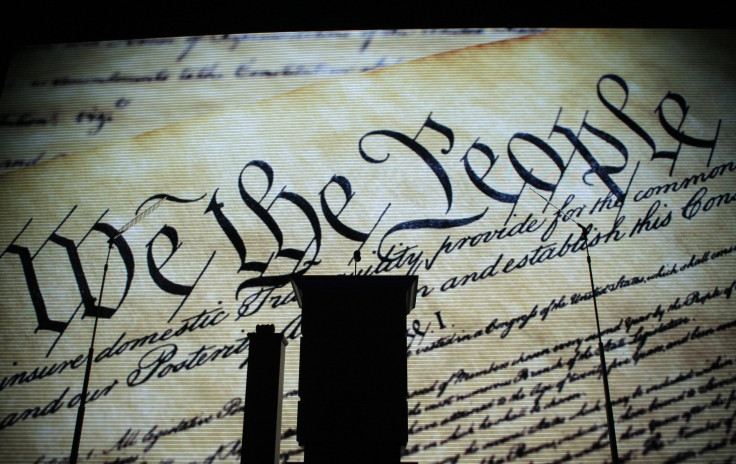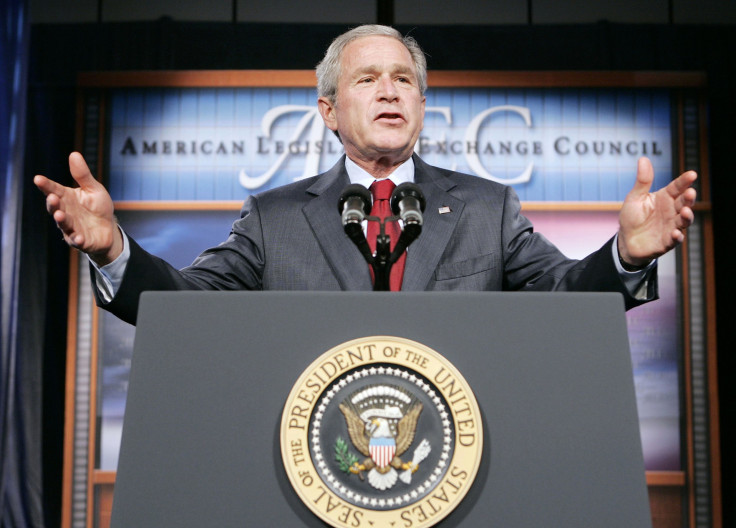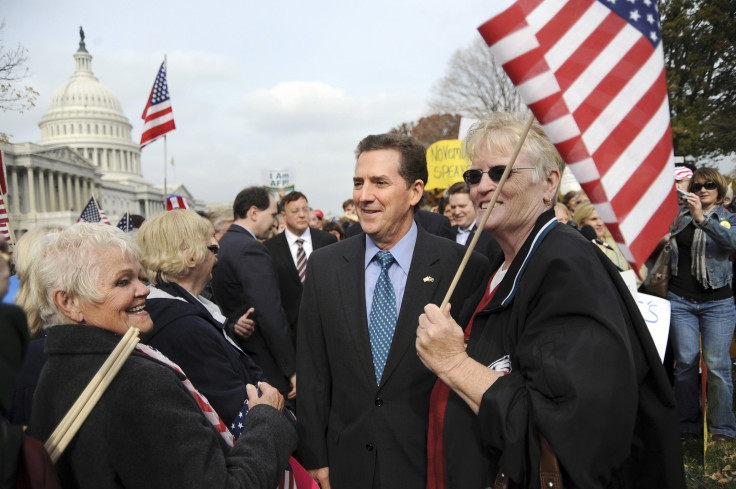The Koch Brothers Want A New Constitution — And They’re Closer Than You Think

Update: The Wisconsin Assembly voted to call for a constitutional convention on Wednesday in a 54-41 vote. The Assembly also passed separate legislation that set the process for selecting convention delegates, and limited those delegates to voting on amendments related to balancing the budget.
Original Story:
The Wisconsin Assembly votes Wednesday on whether to call for a convention to change the U.S. Constitution. While that in itself is surprising — the American people have never exercised their legally enshrined right to convene a new Constitutional convention — what’s more surprising is that pro-business groups with ties to the Koch brothers have pushed for similar legislation in more than 30 states, and they’ve been remarkably successful: A dozen states have passed bills calling for a convention that would produce an altered Constitution that would likely limit federal spending and power.
According to Article V of the Constitution, just two thirds (34) of the 50 state legislatures need to call for a convention for the purposes of “proposing constitutional amendments” (no governor’s signature is required). Those amendments would then need to be ratified by three quarters of the states, currently 38, to become law. But beyond those very basic requirements, nobody knows what the rules for a convention would be, since one hasn’t occurred since the original in 1787. That single instance, Constitutional law experts warn, provides a harrowing precedent: Delegates tore up the Articles of Confederation they had convened to improve, and produced a whole new governing document.
Read: Why Is This Mega-Donor Spending Millions To Defeat Tammy Baldwin?
The Wisconsin legislation, which is supported by Gov. Scott Walker, was introduced by Republican Sen. Chris Kapenga, who introduced similar legislation in January 2014 as a member of the Assembly. His bill would call a convention to pass constitutional amendments that would require the federal government to balance the budget, something that Congress will simply never do on its own, Kapenga told International Business Times.
“For the country to continue spending at this rate, where expenditures are exceeding revenues consistently, is not sustainable,” Kapenga said. “Whether it’s Democrats or Republicans in charge in Washington, it’s not getting fixed, and no solutions are being proposed to deal with it...I think this is the only option left.”
Very proud to be one of only three State Senators to receive a 100% rating on the Freedom Scorecard from @AFPWI! #WIright pic.twitter.com/OkbppUvWjt
— Sen. Chris Kapenga (@SenatorKapenga) October 26, 2016
But while proponents of this kind of legislation say that Congress is incapable of reining in a nearly $20 trillion national debt, opponents believe that the Article V movement is an astroturf effort backed by corporate interests that would eliminate environmental and labor regulatory bodies and slash taxes and spending by forcing the federal government to drastically reduce its reach.
“It’s not just about a balanced budget,” said Wisconsin Democratic Rep. Chris Taylor. “Mostly I think they are going at the social safety net, they are going to go after Social Security and Medicare because it’s so unpopular to cut those programs, and this is how they do it.”
One of the two main groups pushing an Article V convention is the Convention of States, a project by Citizens for Self-Government, a nonprofit that doesn’t disclose its donors and has a variety of connections to David and Charles Koch, the billionaire industrialist brothers whose eponymous company is one of the country’s worst polluters and who have become synonymous with both overt and covert political spending in pursuit of limited government.
Another nonprofit supporting the movement is the American Legislative Exchange Council, or ALEC, an organization “dedicated to the principles of limited government, free markets and federalism” that brings corporations and lawmakers together to draft model legislation that is then introduced in the states. ALEC doesn’t disclose its members, although the group’s opposition to climate change measures, gun control and voting rights has led to a recent exodus of member corporations and lawmakers.
Another anonymous-donor group called the Balanced Budget Amendment Task Force is calling specifically for a balanced budget amendment, as its name would suggest. That group says it has 27 states on board, based on previous calls going back decades for a balanced budget amendment, starting with Indiana in 1957.
ALEC has drafted model Article V legislation and nearly identical legislation passed the state legislature in Missouri at the end of May; it called for a convention to “impose fiscal restraints on the federal government, limit the power and jurisdiction of the federal government, and limit the terms of office for its officials and for members of Congress.” Texas also passed Article V legislation last month, but the bill’s language, like the Wisconsin bill, more narrowly limits convention delegates to voting on amendments that would balance the budget.
“We need to make sure it’s crystal clear that we have no legal authority outside of that discussion point,” Kapenga told IBT. The senator said the bill was not inspired by ALEC or other corporate interests and that his bill differed from ALEC’s model legislation.
"Just because somebody is pushing the same interest as me, doesn’t mean they are driving me,” Kapenga said.
Taylor attended ALEC’s 2013 conference in Chicago where Citizens for Self-Governance pitched the Article V convention to lawmakers. She told IBT she saw the same presentation that inspired Kapanga to author his bill.
“I can’t emphasize this enough: This was a call-to-action workshop,” Taylor told IBT. “This was a workshop where the legislators were told if you don't do this, if you don't lead this effort, if you don't go home and push this amendment, then you will be failing the Republic. It was like a church revival... I’m sitting back there thinking ‘oh my god this is wacky.’
“I was sitting several rows behind the lead author of the bill, Chris Kapanga,” Taylor said. “He’s trying to present this as his own idea. It’s really kind of laughable. I was there. I said to myself ‘I will see this bill in six months.’ Sure enough, I saw the bill in January.”

‘Trump is not the solution’
Convention of the States is populated by Tea Party veterans. It was co-founded by Mark Meckler, co-founder of the Tea Party Patriots, and is chaired by Eric O’Keefe, veteran political operative and longtime Koch brothers ally who worked on David Koch’s 1980 presidential campaign, chaired the now-defunct Sam Adams Alliance, which trained tea party activists, co-founded the Campaign for Primary Accountability, a super PAC that supported primary challenges to incumbent lawmakers of both parties, and directs the Wisconsin Club For Growth.
On Monday, the Convention of States announced that former South Carolina Sen. Jim DeMint, R-SC, who was one of the first elected officials to embrace the Tea Party movement and was recently ousted as the head of the Heritage Foundation, had joined the group.
“I tried to rein in Washington from inside the House and Senate, then by starting the Senate Conservatives Fund to elect good conservatives, and finally as president of the Heritage Foundation, creating and promoting good, conservative policy,” Demit said in a statement. “But once I realized that Washington will never willingly return decision-making power back to the American people and the states, I began to search for another way to restrain the federal government.”

According to the Center for Media and Democracy, Koch-linked groups have donated nearly $5.4 million to Citizens for Self-Government between 2011, when the group was founded, until 2015, the last year tax records are available. IRS filings show Citizens for Self-Government funding increased from $1.8 million to $5.7 million over that period.
“The American people are fed up. Trump is not the solution. He’s a symptom of that frustration,” Meckler told USA Today earlier this week.“The American people are seeing that didn’t solve the problem, so now what? Eventually, they will come to this solution.”

‘A Very Real Threat’
Even though such a convention would be unprecedented, with no clear rules on how it would work, Constitutional law experts admit it could happen.
“I think it is very possible,” David Super, a law professor at Georgetown Law, told IBT. “It’s a very real threat.”
By using what Super calls “fuzzy math,” advocates of the effort say they are actually on the cusp of success. Article V advocates note that many states have called for conventions in decades and even centuries past. When counting those states, the total number of states calling for a constitutional convention is at 27. As Super points out, given that Republicans control Congress, the Executive and the legislatures in 32 states, it’s not hard to imagine a scenario where the “fuzzy math” is enough. If that happens and a convention is convened, Super warns, there would be no enforceable mechanism that would ensure delegates stick to the amendments they were called upon to consider, making a “runaway convention” possible.
“There’s nothing in the Constitution that provides for a limited purpose convention,” Super told IBT. There is precedent that suggests officials selected by the states become federal officials once they take office, and can’t be recalled by the states if they deviate from their stated objective, as convention proponents have argued. And, Super argued, the Supreme Court has largely established that it rules within the confines of the Constitution, so a convention would be outside of its jurisdiction.
“There is absolutely no referee,” Super said. This could open up the convention to a flood of special interest money. And there is no rule stating the convention would have to be open to the public. “We wouldn’t know if everybody with big money was working over the delegates… There are absolutely no rules at all.”
But the one rule that is clear in the current Constitution, a rule which some warn could be rewritten at a convention, is that 38 states, or three-quarters of the states, would have to ratify whatever came out of the convention.
Constitutional Convention opened, Philadelphia, 230 years ago today:#Stearns pic.twitter.com/MlFV35tThU
— Michael Beschloss (@BeschlossDC) May 26, 2017
“There is a risk of a runaway convention,” Michael Gerhardt, a constitutional law professor at the UNC School of Law told IBT. However, he said, “you could come up in theory with a relatively bizarre amendment, but you would need three-quarters of the states to ratify. That’s the presumed protection against a rogue amendment.”
But there’s no time limit for ratification. As the 27th Amendment’s 200-year wait for ratification shows, over time, state legislatures could change hands and a climb to 38 could be possible. (Congress has at times put time limits on ratification for several Constitutional amendments it sent to the states.)
Part of the reason there has not been a constitutional convention is because lawmakers generally react to whatever movement has caused momentum for a convention to build. In the 1970s and ’80s, calls for a convention to enact a balanced budget amendment spurred Congress to act to reduce the deficit.
“Constitutional amendments have never been originated in the states because whenever there are calls in the states, Congress gets ahead of it,” Ilya Shapiro, a senior fellow of constitutional studies at the Cato Institute told the Washington Post in 2015. “Congress will see the writing on the wall.”
Rescinding Outstanding Convention Calls
Still, the possibility of a convention is real enough that in the last few months lawmakers opposed to the idea in Nevada, New Mexico and Maryland have quietly combed through their legislative records to identify, and rescind, all previous calls for a convention so as not to have their states counted toward the 34-state threshold. In 2014, Vermont called for a constitutional convention to overturn Citizens United, but the state’s legislature recently rescinded that call in response to the growing Article V movement.
In Maryland, William Frick, the Democratic majority leader of the state’s House of Delegates, introduced legislation that rescinded at least four previous calls for a constitutional convention that had to do with prayer in schools and repealing income taxes, among other issues.
“We had a sense that there are groups out there looking to make radical changes to the Constitution through this convention process and we didn’t want Maryland to be contributing to that, regardless of what the ostensible subject matter was,” Frick told IBT.
A balanced budget amendment could wreak havoc on the Maryland economy, which is heavily dependent on federal jobs in nearby Washington, D.C. But experts warn the damage wouldn’t be limited to the beltway. While ALEC told IBT that exceptions to the balanced budget rules would exist for cases of war or an emergency, the natural economic cycle of recession and recovery could be exacerbated by a requirement the federal government balance its books.
In January, the Center on Budget and Politics Priorities said balanced budget amendment would “launch a vicious spiral of bad economic and fiscal policy: a weaker economy would lead to higher deficits, which would force policymakers to cut spending or raise taxes more, which would weaken the economy further.”
While nearly all states are legally required to have balanced budgets, the federal government is often there to fill the gaps and provide needed funding in the event of a recession. If the federal government were required to have balanced budgets, opponents argue, recessions would be longer and deeper, because when tax revenues fall, the government would have less money to spend on things like food stamps, unemployment insurance and investment in projects that could spur growth. Essentially, the government would be unable to use Keynesian economic tools.
For proponents, of course, this temporary pain would be an acceptable side effect for the benefits of ending the federal deficit.
A Convention Dress Rehearsal
While experts maintain there is simply no way to know what a convention would look like, what the rules are, or even who would make the rules, some groups have taken steps to turn the abstract concept of a modern constitutional convention into a concrete process. The Assembly of State Legislatures is, as the name implies, a group of state lawmakers who are developing a set of rules that could be used at a constitutional convention. The group is led by Kapanga and Missouri Democratic Sen. Jason Holsman, who introduced legislation in Missouri calling for a constitutional convention in order to implement “free and fair elections,” mirroring efforts by some on the left to use the Article V process to overturn the 2010 Citizens United Supreme Court decision.
Similar rules were developed and used at the Convention of States’ simulated convention in Williamsburg, Virginia, in September. Both sets of rules mandated that each state receive one vote, which means that Wyoming would have the same power at a convention as California. This would drastically tilt the balance of power at a convention toward Republicans. For example, while Hillary Clinton won the popular vote in last year’s election, she won just 20 states and the District of Columbia.
Champions of the Article V push say the simulated convention shows the process would work and wouldn’t become a free for all. “It demonstrates the convention is not going to run away,” Karla Jones, the director of ALEC’s federalism task force, told IBT. “We believe that the runaway convention is myth.”
Given that there was nothing at stake, and no special interests greasing delegate palms, it’s perhaps not surprising the simulated convention didn’t get out of hand. But the amendments the simulated convention did pass would be seen by many as radical changes to the system of American government.
The amendments passed would:
Require a vote of two-thirds in both houses of Congress to increase the public debt for one year.
Restrict Congress’ powers to regulate goods to only “the sale, shipment, transportation, or other movement of goods, articles or persons” across state lines. Congress would not have the power to “regulate or prohibit any activity that is confined within a single state regardless of its effects outside the state.”
Limit members of the House to six terms and senators to two terms.
Give the collective states the power to void any law, statute, executive order, or regulatory rule issued by Congress, the president or regulatory agencies if three-fifths of the states vote against the federal action.
Repeal the 16th Amendment and require a three-fifths vote by the House and Senate to increase or implement new taxes.
Implement a mechanism that would allow a quarter of the House to declare opposition to any federal regulation. If that happened, it would trigger a congressional vote on the regulation and would require a majority of the House and Senate to affirm the regulation.
It’s hard to begin to untangle the myriad consequences of those amendments, but what’s clear is they would drastically reduce the power and scope of the federal government and radically realign the federalist system.
“This is very much abandoning everything our country has been,” Super told IBT. “This is not tweaking or improving — this is abandoning it.”
© Copyright IBTimes 2024. All rights reserved.






















